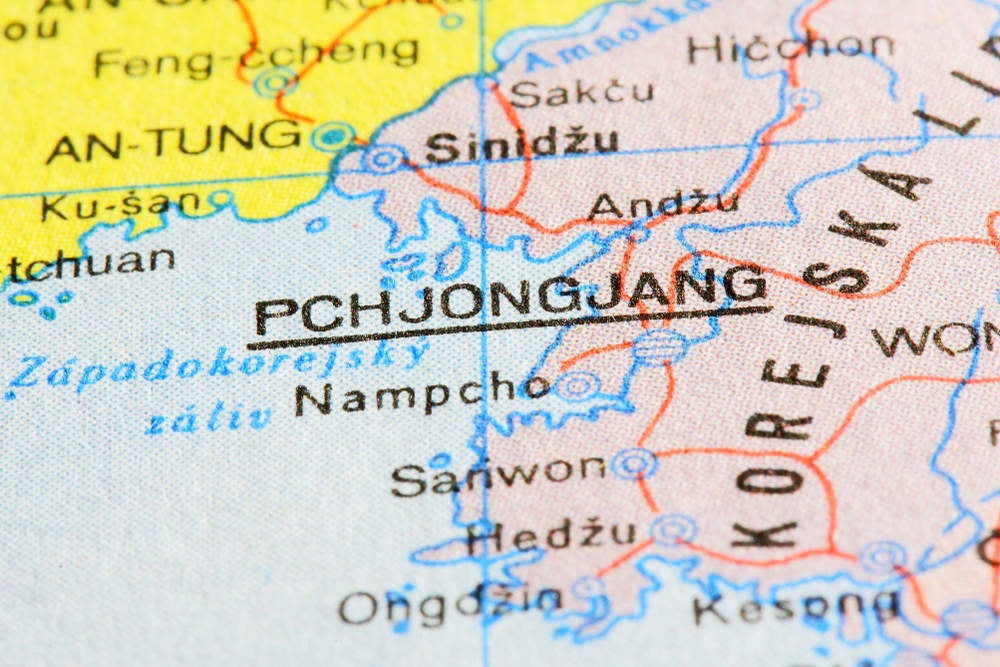
US President Donald Trump has announced the largest package of sanctions against North Korea yet.
The focus of this new set of sanctions is on the communist country’s nuclear and missile programme which is prohibited under international law.
The US Treasury issued sanctions against 28 vessels, 27 companies and one individual across nine jurisdictions, including China, Singapore and Tanzania.
In early February, Trump’s Vice President Mike Pence hinted the US administration would impose tougher sanctions on the North Korean state.
Pence made his announcement during a visit to Tokyo, Japan ahead of attending the opening ceremony of South Korea’s Pyeongchang Winter Olympics.
The daughter of and adviser to the US President, Ivanka Trump, was arriving in South Korea when the announcement was made.
How well do you really know your competitors?
Access the most comprehensive Company Profiles on the market, powered by GlobalData. Save hours of research. Gain competitive edge.

Thank you!
Your download email will arrive shortly
Not ready to buy yet? Download a free sample
We are confident about the unique quality of our Company Profiles. However, we want you to make the most beneficial decision for your business, so we offer a free sample that you can download by submitting the below form
By GlobalDataShe is meeting with South Korean President Moon Jae-in and will attend the closing ceremony of the Winter Olympics.
What was said:
Trump said:
Today I am announcing that we are launching the largest-ever set of new sanctions on the North Korean regime.
The treasury department will soon be taking new action to further cut off sources of revenue and fuel that the regime uses to fund its nuclear programme and sustain its military by targeting 56 vessels, shipping companies, and trade businesses that are assisting North Korea in evading sanctions.
While on a visit to Tokyo Pence said the US will soon roll out “the toughest and most aggressive round of economic sanctions on North Korea ever”.
He said:
We stand up to murderous dictatorships. And we will keep standing strong until North Korea stops threatening our country, our allies or until they abandon their nuclear and ballistic missiles once and for all.
Why it matters:
Senior officials from North Korea and South Korea have been holding friendly talks over the past few months for the first time in two years.
The two countries also marched under the same banner at the Pyeongchang Winter Olympic ceremony.
A high-profile North Korean delegation was sent to the city after South Korea lifted some sanctions temporarily to allow their entry for the sporting event.
This has been seen as a dramatic step forward for relations on the Korean peninsula. No missile tests have been conducted by the North since November; the inter-Korean talks began in January.
One member of the delegation was North Korean leader Kim Jong Un’s sister, Kim Yo-jong. She met with South Korea’s President Moon Jae-in for dinner at his presidential Blue Palace during her visit and invited him to visit Pyongyang.
The two Koreas are readying themselves for future talks. South Korea are preparing the appropriate conditions for a summit between Kim Jong Un and Moon Jae-in.
In another gesture of goodwill which shows the commitment of the South Korean government to moving towards peace between the Koreas, it has lifted the sanction on Kim Vong Chol who is blamed for the 2010 sinking of a South Korea ship which caused the death of 46 sailors.
The US remains sceptical of the authenticity of the latest North Korean attempts at détente with its neighbour — criticising the North’s inconsistency.
The US perspective has not been improved by Kim Jong Un hosting a military parade to rival the opening ceremony and to showcase the progress of the country’s nuclear programme.
These US sanctions are not related to a nuclear test or missile launch undertaken by the North Koreans, as previous sanctions have been.
They have the potential to jeopardise the improvement in relations between the Koreas and push North Korea towards resuming its more aggressive stance towards its Southern neighbour.
Background:
The UN imposed sanctions against North Korea after its first nuclear missile test in 2006. Security Council resolution 1718 demanded the Communist country cease nuclear testing and prohibited the export to North Korea of some military supplies and luxury goods.
As North Korea undertook further nuclear tests and missile launches, the UN Security Council strengthened its sanctions.
It broadened the arms embargo in 2009, imposed sanctions on money transfers in and out of Korea in 2013 and banned the exports of metals including gold, titanium, silver, zinc and copper in 2016.
In 2017, the UN banned the export of coal, iron and lead, limited imports of crude oil and petroleum and imposed restrictions on North Korea’s Foreign Trade bank.
The US began sanctioning the Communist country in 2008. Former US President Barack Obama declared a national emergency by national order.
This was because of the threat of North Korea’s proliferation of nuclear weapons as a result of the communist country’s multiple tests. The sanctions were strengthened and expanded over the following years.
The North Korea Sanctions and Policy Enhancement Act was introduced in 2016 following nuclear and ballistic missiles tests. It sanctioned entities found to have contributed to North Korea’s nuclear weapons programme and to have participated in North Korea’s metal or mineral trades.
Trump has issued numerous executive orders sanctioning North Korea.
Following the death of tourist Otto Warmbier, US nationals are banned from travelling to North Korea. North Korean nationals are banned from entering the US.
The US can freeze the assets of any business or organisation trade with Kim Jong Un’s state.
No ship that has entered North Korean ports can enter US ports for 180 days.
China, South Korea and Japan also have their own sanctions against North Korea.







